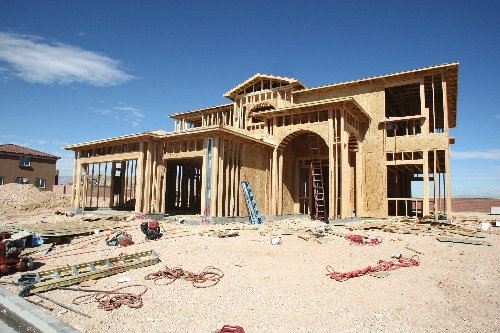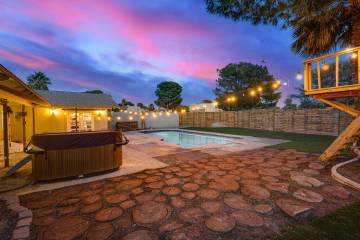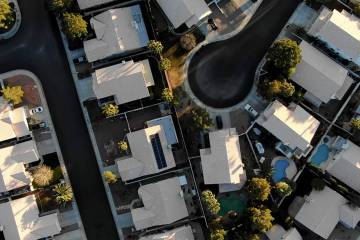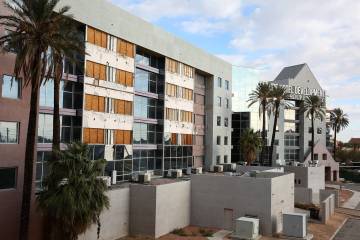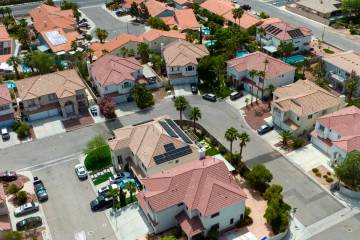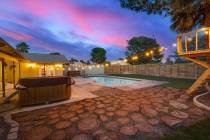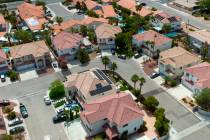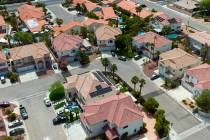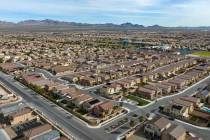Unfazed by numbers, analyst forecasts fewer foreclosures
The statistics are stacked against Las Vegas: highest foreclosure rate in the nation, 80 percent of homeowners "underwater" on their mortgage, half of homes with 25 percent or more negative equity, 16 percent of homeowners delinquent on their mortgage, 13.8 percent unemployment.
Nevertheless housing analyst Larry Murphy said Thursday he seriously doubts the market will be flooded with the "shadow inventory" of foreclosures at the end of the year.
He's revising his foreclosure predictions downward.
"We had 25,000 last year, and I said we'd probably have the same amount this year," Murphy said at his quarterly Crystal Ball presentation at the Suncoast. "We probably won't see 25,000. We probably won't see 20,000. We might only see 15,000 foreclosures in 2010."
Murphy, president of Sales-
Traq, a Las Vegas-based housing research firm, said he has a few reasons to believe the foreclosure count will drop this year, including loan modifications, short-sale alternatives, state-required mediation and rent-for-deed programs.
Finally, there's the "reluctance factor," Murphy said. Banks are reluctant to carry through on the foreclosure process, which can be costly and time-consuming. They would much rather keep the homes off their balance sheets and have someone making a payment.
Murphy said he's re-evaluating the 12 different sales codes that the Clark County Assessor's Office uses on escrow closings to determine where to send the tax bill. Nearly all of the codes are "F" for foreclosures, "T" for trustee sale and "R" for a regular sale, he said.
What he hadn't been counting is the number of homes sold at auction each month, which was 425 in March. They're becoming more popular, ranging from 200 to 500 sales a month, he said.
In sorting through escrow closings, Murphy noticed certain names showing up every month, usually in the form of a limited liability company. For example, he'd see King Tut Enterprises LLC on 15 deeds a month, suggesting it's probably an investor group buying at a substantial discount at auction.
Murphy came up with his own "hybrid" coding system that includes "A" for auction and "S" for short sales, or homes sold for less than the mortgage owed.
In looking at foreclosures and trustee sales, if the grantee and beneficiary are the same, the bank is taking title. If they're different, it's a third-party purchase at auction, he found.
"This is probably the first-of-its-kind system in the country," Murphy said. "It addresses the problems and mistakes I've made in the past."
SalesTraq reported 4,671 existing-home closings in March, a 20.3 percent increase from the same month a year ago. The median price dropped 10.4 percent to $120,000.
There were 1,809 real estate-owned, or bank-owned, homes sold at a median price of $124,000; 899 short sales at a median of $120,000; 425 auction sales at $95,000; and 1,538 nondistressed sales at $123,000.
Murphy said the REO median price is higher this year because the homes are larger on average and more upscale. While earlier foreclosures were entry-level homes caught in the subprime mortgage crisis, they now tend to be higher-priced and not necessarily from a subprime borrower, he said.
New-home sales totaled 499 in March, up 5.1 percent from a year ago. The median price decreased 5.3 percent to $208,178.
Geoff Gorman, sales manager for Las Vegas startup Harmony Homes, said many homebuyers are "sick and tired of trying to buy a foreclosure." They're up against multiple bidders, many of them with cash offers on an older home in disrepair with dead landscaping and worn-out appliances, if any.
Harmony had seven subdivisions when Gorman joined the company in October and has opened six more since. The builder closed 68 new-home sales in March and had 10 in the last week, he said.
Harmony captured a 10 percent market share in the first quarter with just 3.5 percent of new-home inventory.
"I can tell you, there are prospects out there," Gorman said at Crystal Ball. "Every sale takes a fight and it takes a fight from people who know what they're doing."
Asking prices keep falling, but not as much as last year, San Francisco-based real estate search site Trulia.com reported.
Thirteen percent of listings in Las Vegas showed price reductions in April, compared with 28 percent in the same month a year ago. The year-over-year decline of 54 percent is best in the nation, followed by San Diego (-52 percent); San Francisco (-45 percent), New York (-45 percent) and Los Angeles (-40 percent).
It's the fourth straight month of declines in Las Vegas for home-price reductions, Trulia.com spokesman Paul Loeffler said. Price reductions peaked in June at 30 percent. The average amount slashed from the original listing price in Las Vegas is 15 percent, which is well above the national average of 10 percent.
While low-priced foreclosures dominate the Las Vegas market, a spike in home sales is sopping up inventory, Trulia found.
Contact reporter Hubble Smith at hsmith@reviewjournal.com or 702-383-0491.



